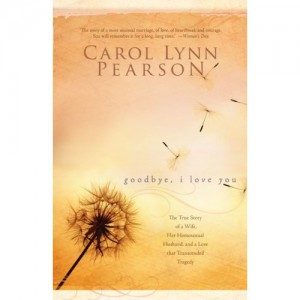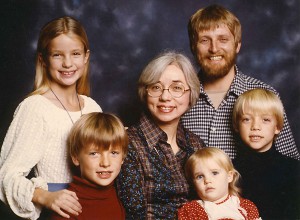“Good Bye, I Love You:” A Story of Love
 by Grant Hollingsworth
by Grant Hollingsworth
Originally published in Affinity, February 1990
Carol Lynn Pearson’s book, Good-bye, I Love You, is a personal account of her struggle to understand her husband, Gerald, the love they shared, their religious life, homosexuality in general, her husband’s in particular, AIDS, and Gerald’s death.
It is true they were the ideal couple, had four wonderful children, loved and admired each other, were active as a family in their church. They seemed so complementary in all their works and interests. Gerald was a man of great “magnitude” (as his wife described him). He was deeply concerned with his personal integrity, self-honesty, the respect of others and of God. He was described as “industrious” and “creative.” He understood his wife well and knew how to stimulate with her toward personal and professional development. In fact, he borrowed two her first volume of poetry thousand dollars to publish poetry which eventually became quite successful.
To me this is the essential beauty of their relationship as it is presented in the book. It is not a book about the struggle of being homosexual, Mormon, and having AIDS. Rather, it is about a most beautiful relationship between two people. It is a story of love between two human beings which walks you through the struggles, changes, and compromises they made for love. The book details their inner fight to understand the love that was given to them to share—even when it could no longer be shared physically. It involves you in the process by which this family unit refined and maintained a quality, highly respected love which prevailed until Gerald’s death.
Gerald spent years trying to understand his homosexual feelings. He tried to change them; put them away; counseled with the appropriate Church authorities; and, finally, felt he could no longer deny his nature. This acknowledgement of self brought about intense feelings of rejection by his wife. Carol, herself, felt deeply stripped of her womanliness and the ideals upon which their marriage was founded. It was their strong love for each other, however, that allowed for continued growth both as a family and as a couple. Looking back upon the original married relationship, I see it as one which never lacked verbal or physical affection. They always worked at supporting each other. In this climate of mutual support they grew as individuals. Yet, they never grew apart. Much to the contrary, their love, as a divorced couple, was really no different from when they were married. The fact that they ceased to have more children together did not change the meaning of their love. They simply could not now share physical love with same integrity and honesty because of Gerald’s newfound awareness.
At one point prior to their union, Carol was troubled by the concept of “God’s true order of marriage, polygamy” and said to Gerald, “I want an exclusive relationship with someone—you! I like the idea of two people being exclusively committed to each other. That’s the only thing that makes sense to me.”
Even though Gerald was struggling with an attraction toward men before he met Carol, I feel that he shared the desire for an ideal monogamy with this wonderful woman. He loved her for who she was—an individual—one that would always grow along with him. I believe that his love was deeply felt. It was a sensitive, trusting love. Gerald truly trusted that the marriage would work.
It did not work, at least not according to conventional expectations of marriage. Yet by other standards, it was perhaps more successful than many. As they worked through the time God gave them, they fought hard to maintain their commitment, balancing their own needs with those of their family and loved ones, but they did keep it while they were married. They learned to call upon their own strength of soul for answers. They took great steps and the results were tremendous. One might argue that he was being selfish by leaving her in pursuit of a better life. I believe he desired just as much happiness and fulfillment for her as for himself. What’s more, he understood that lacking these things himself, he could not really provide them for her.
“Nothing. It’s just me. Just life,” Gerald said many times to his fiancée and later wife. To me these words are monumental. I believe I have come to understand their meaning well. In the struggle to make sense of your homosexuality, you agonize over what’s wrong. You deny you have a problem, yet you blame yourself for it. You don’t know how to solve it; you feel powerless, you lose hope. Denial, blaming oneself, helplessness, and despair are familiar to many homosexuals. So often these words are the expression of confusion, weakness, and fear—words formulated from within a directionless heart. It is our heart which houses the God-given love we all possess. How can it lack a direction? Ironically, these same words contain the answers our dilemma. Turn them around; give them a positive meaning, and they become powerful. What’s wrong with me? Nothing. What is this dark, unspeakable obsession I feel? It’s only me. Have I done something terribly wrong to deserve this? No, it’s just life. Positive thought equals trust and faith; negative thought equals emptiness.
Self-acceptance allows the love of self to be developed as well as the capacity to love others. The extension of one’s love toward others can only begin from the extender’s own heart. It cannot be true and righteous if the body and soul of that love are not internally consistent twenty-fours hours a day. (With whom do we spend twenty-four hours a day? You answer that one.) By knowing what’s inside of us, we understand more and more our own person. What makes and maintains our person is the blood that flows through our veins. The source of nourishment is our heart, and our heart is nourished by the spirit of God. Perhaps a lesson similar to this was taught to Carol by her husband. I felt a great deal of pain coming from Carol as she worked toward accepting Gerald’s “new loves” which never seemed to work out. Her love for him included the enduring hope that “this one would be the one;” the reward Gerald was searching for.
I wonder if Gerald’s reward ever came. Elder John H. Groberg, referring to Gerald’s death from AIDS, said in a sacrament meeting, “Carol Pearson’s husband got what he deserved.” I can hardly even consider accepting that the enrichment and love they shared with each other was anything less than God-given, and that Gerald’s attempts to understand and share this other part of his love would not be respected by our Father in heaven. I believe he received the ultimate reward, for I also believe in God. I faithfully look forward to meeting Elder Groberg someday in heaven. It will be too late to debate as to who was more righteous. It has been said that we are judged on having children, and gays will not be admitted because they cannot have children. And of those heterosexuals who cannot have children for some reason…? The Lord will deal with them in his own way. The same truth holds for homosexuals who understand and are faithful to their rightful love as they too share it with their brothers and sisters.
See also:
Reviews by Elizabeth Hansen and Jeffrey Needle available on the website of the Association for Mormon Letters.
